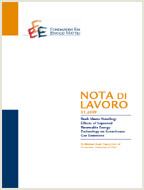Equilibrium and Matching under Price Controls

Data
10.06.2015
10.06.2015
Autori
P. Jean-Jacques Herings (Maastricht University)
Codice JEL
C71, C78, D45, D51
C71, C78, D45, D51
Parole chiave:
Price Controls, Matching, Stable Outcomes, Competitive Equilibrium, Drèze Equilibrium
Price Controls, Matching, Stable Outcomes, Competitive Equilibrium, Drèze Equilibrium
Publisher
Climate Change and Sustainable Development
Climate Change and Sustainable Development
Editor
Carlo Carraro
Carlo Carraro
The paper considers a one-to-one matching with contracts model in the presence of price controls. This set-up contains two important streams in the matching literature, those with and those without monetary transfers, as special cases and allows for intermediate cases with some restrictions on the monetary transfers that are feasible. An adjustment process that ends with a stable outcome is presented, thereby proving the existence of stable outcomes. The process contains the deferred acceptance algorithm of Gale and Shapley (1962) and the approximate auction mechanism of Demange, Gale, and Sotomayor (1986) as special cases. The paper presents a notion of competitive equilibrium, called Drèze equilibrium, for this class of models, an extension of the concept as developed by Drèze (1975) for economies with divisible commodities subject to price controls. It is shown that Drèze equilibrium allocations are equivalent to allocations induced by stable outcomes. One implication is the existence of Drèze equilibria. Another implication is the equivalence of a competitive equilibrium concept and the concept of stable outcomes that is valid with and without monetary transfers as well as when monetary transfers are limited.
***
Suggested citation: Herings, P.J.J., (2015), ‘Equilibrium and Matching under Price Controls’, Nota di Lavoro 54.2015, Milan, Italy: Fondazione Eni Enrico Mattei
